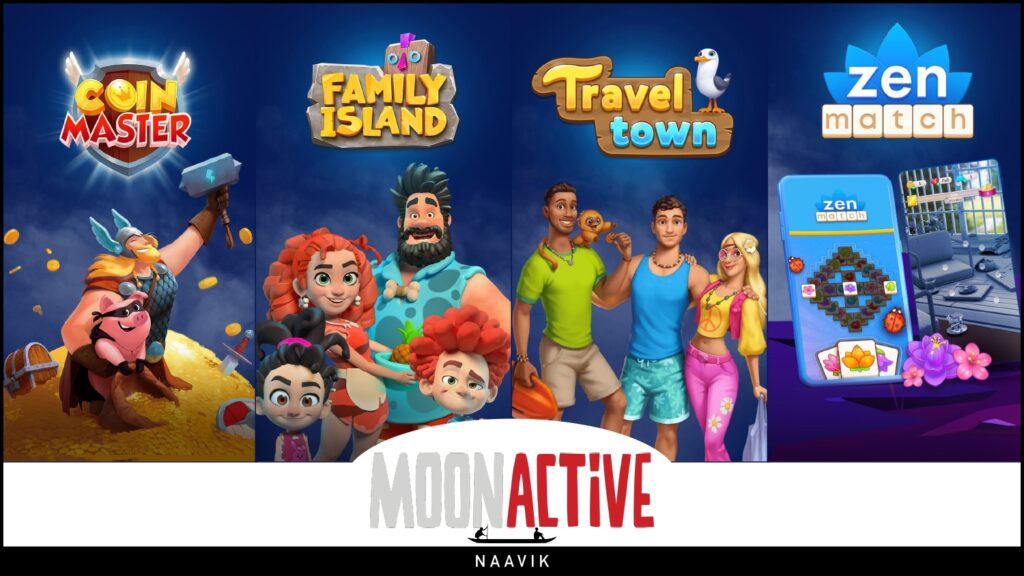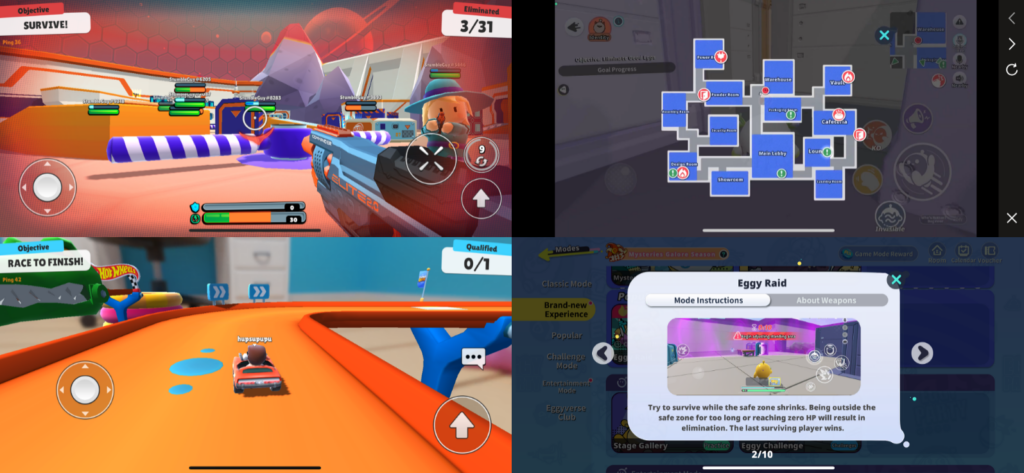
Where Founders Have Been Building at the Intersection of Gaming x AI
The launch of successful consumer-facing generative AI models, like OpenAI's ChatGPT, Midjourney, and Stability AI's Stable Diffusion, has catapulted artificial intelligence and machine learning into the zeitgeist.
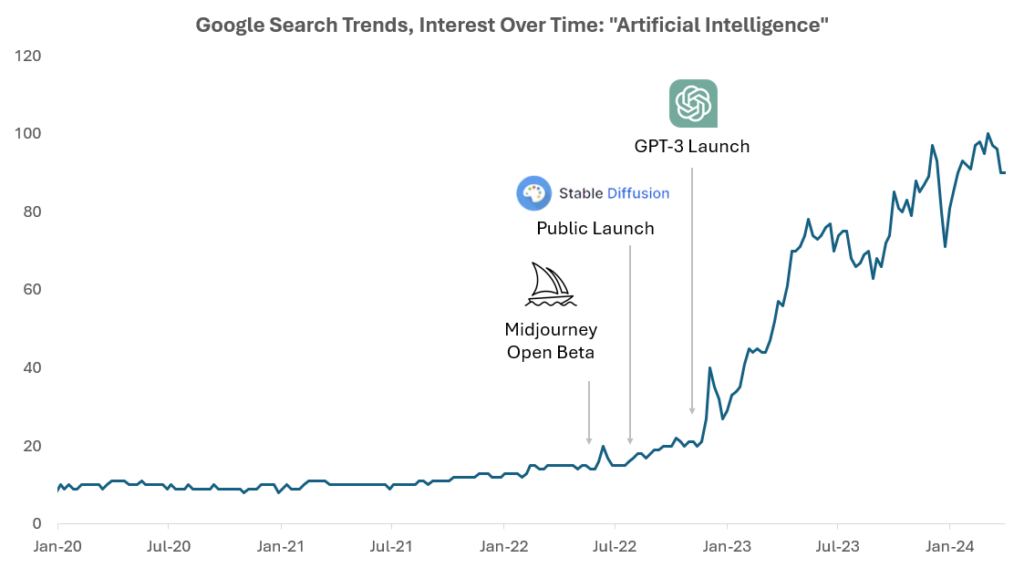
The gaming industry, too, is flush with excitement over AI/ML’s potential, and stands to be one of the early beneficiaries of the advancements in generative language, visual, and audio tools. This enthusiasm has kickstarted a new wave of entrepreneurship focused on applying AI advancements to gaming, and many venture capital firms are actively backing teams building at this intersection.
A study of the startups that have successfully raised funding provides valuable insights into where builders and investors see the biggest opportunities, and where the next wave of technological advancements is likely to emerge from.
In today’s digest, we'll follow the flow of venture capital funding into the gaming space, and complement our analysis with direct commentary from operators and investors who are actively building and investing at the frontier.
Note: The data below focuses on publicly announced investments made by venture capital funds with a thematic focus on games(list of investors courtesy of InvestGame).It excludes non-gaming deals for larger generalist firms. The data comes from Pitchbook, and may not encompass all investments made by each firm.
The Numbers
While there is a growing sentiment that the broader venture capital ecosystem has been over-indexing toward AI/ML startups, gaming-focused VC funds have been more conservative than their broader peer group, deploying 11% of capital invested since 2022 into this area, relative to about 20% for VCs at large.
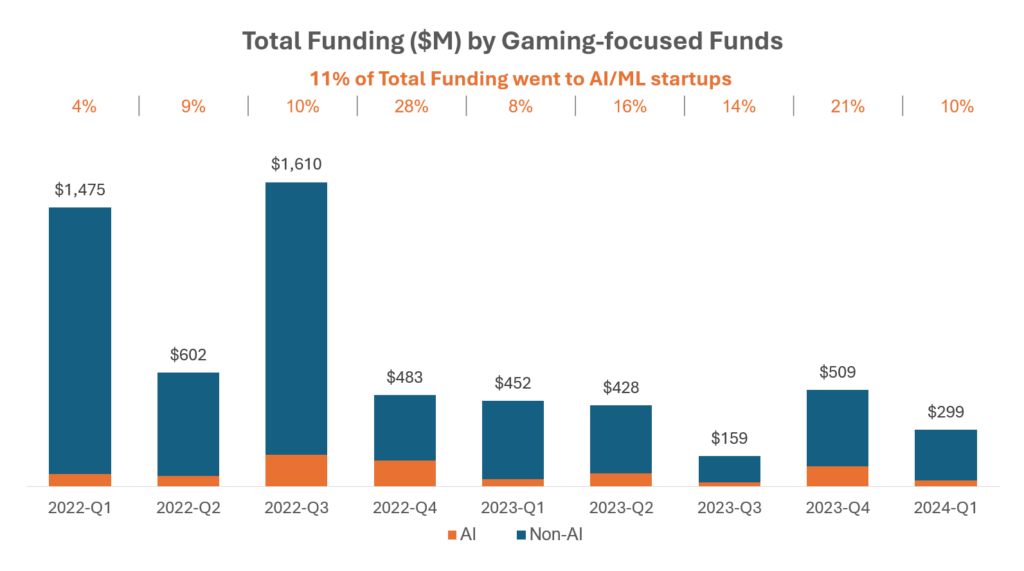
Although there are exceptions, it’s also worth noting that companies innovating at the intersection of gaming and AI have not received material deal-size premiums relative to their non-AI peers.

Regardless, many startups are looking to bring AI to gaming, and collectively, they’ve raised close to $700M in disclosed funding since the beginning of 2022. These startups generally fall into one of four categories: efficiency tools for creators, enabling new patterns of play, AI-enabled game developers, and moderation tools.

Efficiency Tools for Creators
Of the four categories discussed, startups building AI tools to improve efficiency for creators have raised the most funding.
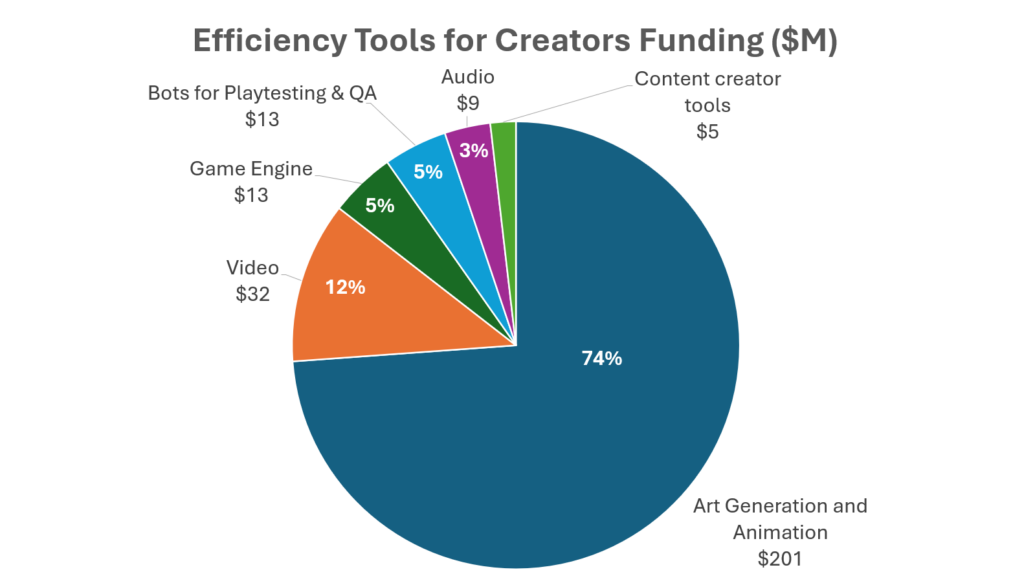
Approximately $200M (74% of the total raised) went toward companies building generative art and animation tools. The marquee transaction in this space was the $101M Series A funding round for Stability AI, the company behind popular text-to-image model Stable Diffusion.
Other startups that received sizable funding rounds include Leonardo.Ai, which is built on top of Stable Diffusion and provides creators with better prompting and workflow tools to generate 2D/3D assets, and Kaedim, which combines AI and human input to provide faster outsourced 3D asset production.
The team at Tirta Ventures (Justin Yuan and Tyler Matses) provided the following commentary on their investment in Leonardo AI: “Leonardo gives developers access to a sophisticated generative AI content production platform capable of creating visual assets at scale with unprecedented controllability and consistency. When observing the game development ecosystem today, from indie to AAA, generative art has long acted as a gateway to broader studio-level generative AI adoption, typically beginning with the ideation phase and quickly expanding to asset production and broader design choices.
However, the greater opportunity for a company like Leonardo extends well beyond gaming and into other creative industries such as fashion, marketing, and graphic design. Generative AI has fundamentally transformed content consumers into content creators, enabling non-artists/designers to create and contribute in ways that were previously not possible. Therefore, what was once simply an image generator has evolved into a versatile prosumer application that becomes increasingly sophisticated and entrenched over time.”
Beyond art and animation, other categories of efficiency tools that have received funding include AI-native game engines (e.g. Series AI), AI bots for playtesting and QA (e.g. Modl.Ai), generative video and audio tools (e.g. PlusMusic), and content creator tools (e.g. Sizzle.gg).
Enabling New Patterns of Play
The second highest funding amount went to startups leveraging AI to enable new patterns of play. This includes companies building intelligent nonplayable characters (NPCs), creating entirely novel game experiences by integrating AI, and using AI to enable players to play a bigger role in creating content (UGC).

The topic of intelligent NPCs has received the most press coverage, with a landmark transaction in late 2023 valuing InWorld AI, the leading player in the space, at $500M. Moritz Baier-Lentz, Partner at Lightspeed Ventures who led the investment in InWorldAI, shared the following insights on the investment:
“If previous platform shifts, like the introduction of the internet or the mobile phone, teach us where we should expect outsized valued creation in this wave of generative AI, it won't be companies that provide incremental improvements of existing workflows, but startups that take on completely novel, previously impossible player experiences.”
“It's a fascinating and fast-evolving space,” continued Baier-Lentz. “Companies like Inworld AI have evolved from an initial wedge in AI NPCs to a range of run-time AI solutions in video games like agentic simulations and dynamic game states to now even offering design-time AI solutions for character, scene, script, dialogue, and quest design in partnership with Microsoft and Xbox. After seeing some of the early indie experiments and AAA prototypes, sentiment toward run-time AI among developers has also trended significantly upward, with almost all game developers (a whopping 96%) now excited about some form of design-time or run-time AI solutions.”
Startups are also looking to build entirely novel game experiences by integrating AI. For example, Proxima’s viral game Suck Up! is a voice-based game in which you play a vampire and try to trick intelligent NPCs into letting you into their house.

At the technological frontier, startups are building AI/ML tools that blur the line between players and creators. The recent Google Genie showcase, which demonstrated games being created by single image prompts, likely sparked our imagination about the future concept of the "player-creator."
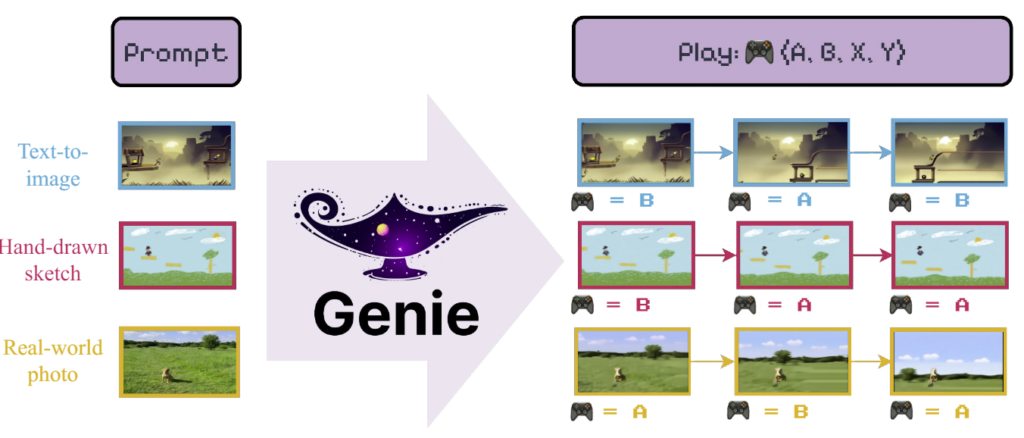
Although a generative game engine capable of reaching mass consumer adoption is probably still some time away, startups innovating in this space are taking small steps toward that ultimate goal. For example, Hidden Door is leveraging generative AI to allow players to create their own personalized online social RPGs.
AI-enabled Game Developers
Another area where startups have received funding is leveraging AI to redefine their game development processes for existing play patterns. For example, Cosmic Lounge is developing a puzzle game using proprietary AI tools to enable better game design, faster content creation, and rapid iteration.
Sikander Chahal, Principal at Transcend Fund, which led the €4M seed round for Cosmic Lounge, shared the following thoughts: “In the game development space, AI is not just an auxiliary tool but a transformative force. We are incredibly excited about how AI can supercharge teams by enabling entirely new design, production, and live operations methodologies. A fundamentally new tech stack and development process enabled by AI will emerge from new teams operating at scale. While incumbents will struggle with the inertia of outdated processes and the rapid pace of innovation, benefiting from the status quo, startups like Cosmic Lounge are seizing the opportunity to redefine the industry from the ground up.
Cosmic Lounge is a standout example of leadership in this new era, with their pragmatic and results-driven application of AI in puzzle game development. Their novel architecture and workflows ensure that each advancement in AI technology enhances their competitive edge rather than being made obsolete. Their AI puzzle engine rapidly generates entirely new designs and levels, automatically coding playable prototypes with full assets in minutes, achieving efficiency gains in orders of magnitude for product-market fit testing. This plugs into a whole suite of AI-enabled live operations and optimization tech that creates an incredibly powerful iteration and feedback loop. This process is critical in the puzzle category, and creates a strategic advantage where the value compounds into new hit games. It's exceptionally rare to see a team so far ahead.”
Moderation
Last but not least, moderation is another area where AI advancements are set to have a large impact. Two notable startups in this space are Modulate, which provides a proactive voice-native moderation solution, and GGWP, which combines in-game behavior with comms to moderate bad actors.
Dennis Fong, the CEO and Co-Founder of GGWP, provided the following color on how AI is being used in his company to build a better and more comprehensive moderation solution: “GGWP is a digital safety platform that uses multimodal AI to proactively detect and respond to incidents in chat and other in-game behaviors. Our system identifies both positive and negative behaviors and also ingests and normalizes data such as social graphs, reports and sanction history, game logs, and more. This is to understand the context and intent of a particular incident, since having a comprehensive understanding of all of a user’s behavior – historically and holistically – is critical to effective moderation. For example, two players engaged in what appears to be toxic chat with one another won’t actually be penalized if we know they’re friends.
The ultimate goal of GGWP is to help companies protect their users from harm and shape their behavior to where positive play is the norm. Educating users when they’ve done something wrong and providing them with positive reinforcement when they’ve done something good is an important part of our toolset – and it’s all enabled through AI-based automation. This is why we’re so excited about AI’s ability to completely transform the digital safety infrastructure for games and online platforms.”
Other
There are also a number of startups that fall outside of the four categories discussed above. They range from companies like Ready Player Me, which is a cross-game avatar platform enabled by generative AI tools, to Canopus, which uses artificial intelligence to improve network visibility for internet service providers in a privacy-friendly manner.
Conclusion
What we’re seeing is probably just the first wave of companies building at the intersection of gaming and AI. As the underlying technology continues to improve, more entrepreneurs will come up with creative ways to apply these tools to the gaming industry.
Investments in efficiency tools should allow smaller teams to build increasingly ambitious games, and startups looking to redefine their development processes around AI tools will have a leg up on incumbents weighted down by inertia. Creative developers will find ways to incorporate AI into gameplay and create new, engaging play patterns that expand the industry's total addressable market. Consumers will also have better in-game experiences from improved moderation.
On the flip side, the AI industry as a whole is subject to stroke-of-the-pen risk, and advancements can be stifled by increased regulation around data privacy. Startups that are building on top of foundational models could also see a higher share of economics taxed by the providers of these models. The democratization of creation enabled by these tools could also reduce differentiation and drive value toward distribution channels rather than creatives.
While the technology holds immense potential, and numerous talented teams are innovating in this space, we remain cautiously optimistic about the future.
A Word from Our Sponsor: GRID

Unlocking the Potential of In-Game Data for Everyone
GRID is a game data platform offering esports data infrastructure, management, and distribution solutions to the leading game publishers, including Riot Games, Ubisoft, and KRAFTON, and tournament organizers in the VALVE Ecosystem for CSGO and DotA2, collaborating with PGL, IMG, WePlay, or Perfect World.
Through GRID Distribution Solutions, over 350+ integrated customers across 20 use cases, from talent scouting to AI applications, get access to live game data. The customizable GRID Data Portals provide a tailored data experience for various user groups, including competitive stakeholders, and the GRID Open Access provides free entry to esports data for fans, developers, community creators, and academic projects.
GRID's mission is to democratize access and unlock the potential of game data for everyone.
Game(s) of the Week
NBA Infinite vs NBA 2K24 MyTEAM: Battle of Basketball Team Builders
Written by Jordan Phang, Naavik Consulting Partner
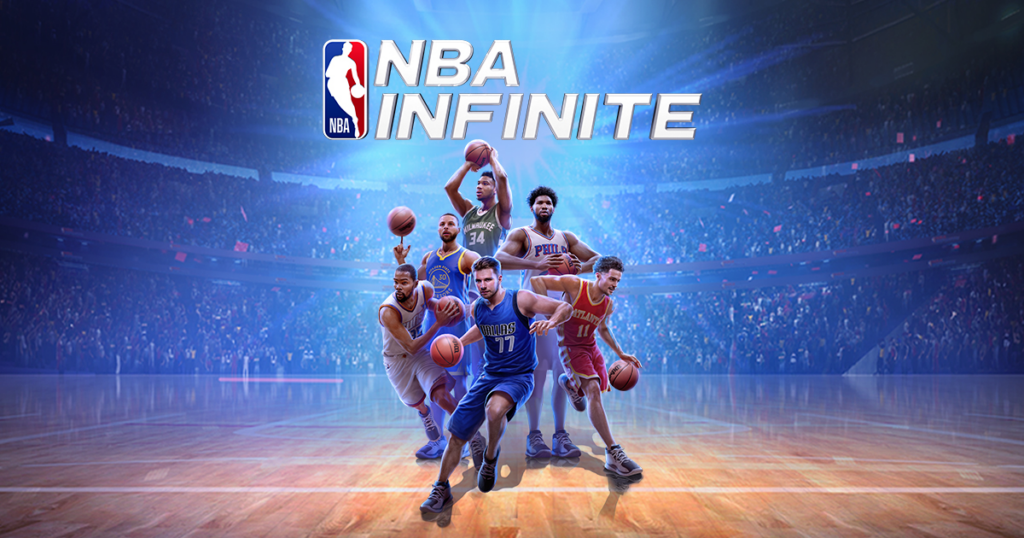
Game: NBA Infinite
Developer: Level Infinite, Lightspeed Studios
Publisher: Tencent
Platform: Mobile
Status: Launched December 2023
Genre: Sports
Gameplay: Link
Game: NBA 2K24 MyTEAM
Developer: 2K Games
Publisher: 2K Games
Platform: Mobile
Status: Launched December 2023
Genre: Sports
Gameplay: Link
What Is It?
NBA Infinite and NBA 2K24 MyTEAM are basketball games with a focus on collecting and upgrading a large roster of players, similar to EA Sports FC Ultimate Team. They focus on slightly different things, with NBA Infinite being almost entirely multiplayer while NBA2K24 has both single player and multiplayer options.
The difference in focus is also exemplified by NBA Infinite starting you out in its 3v3 multiplayer mode where you control a single player in a three-player team. In NBA 2K24’s main 3v3 mode, however, you control all the players in the team, (It also has a co-op 3v3 mode.)
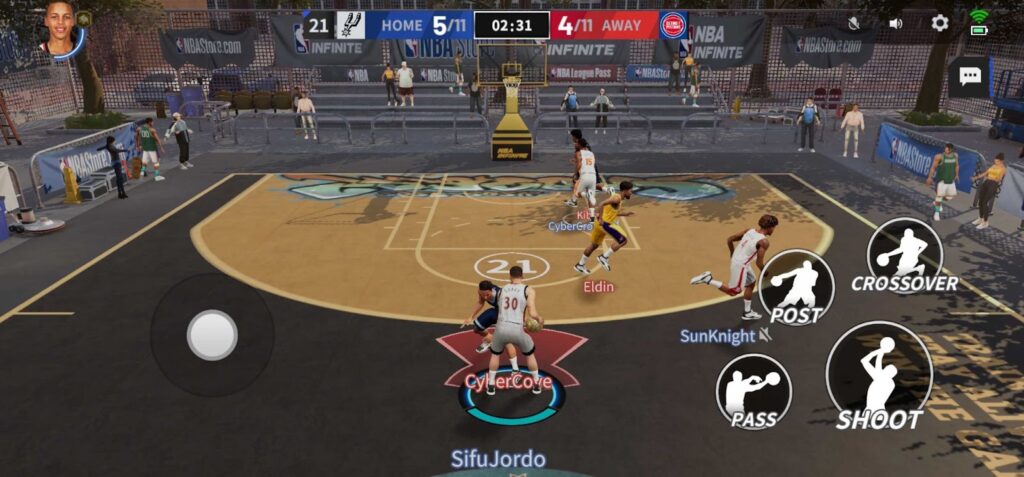
How Are They Doing?
At the time of writing, NBA Infinite has the lead for downloads (5.92M vs. 2.11M), while the reverse is true for revenue, with NBA 2K24 leading by $2.49M vs. $1.88M. NBA Infinite’s RPD is particularly poor at $0.32, with NBA 2K24 handily beating it with an RPD of $1.17.

However, they both lag behind leading sports titles like Konami’s eFootball 2024 (RPD $5) and Professional Baseball Spirits A (RPD $110!). Admittedly, those titles are hyper-focused on Japan, the leading country in terms of spend per user.

In terms of engagement, NBA Infinite leads D1 retention, but then lags behind NBA 2K24 in D7 and D30, though both aren’t great at long-term retention. In comparison, titles like EA Sports FC Mobile have a D30 of 15%. These games still have a ways to go.
NBA Infinite vs NBA 2K24 MyTEAM
When playing these games, it’s clear that NBA Infinite was developed to be mobile-first and has a more arcade-y feel. Movements are quicker, and it’s very easy to get to the rim for a dunk or to hit a shot.
NBA 2K24, on the other hand, feels more like the console experience translated into mobile. It has much better graphical fidelity, more realistic movement, and it takes more skill to make shots. It also has the advantage of cross-progression with the console versions, so if you log in with your PlayStation or Xbox account, you’ll have all your currencies, players, and progression synced.
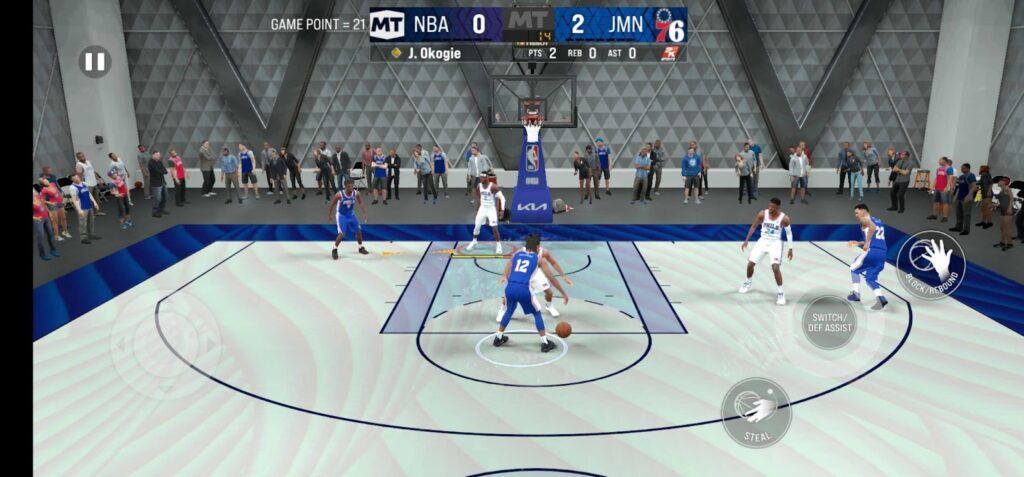
The difference between how the two games handle players is also stark. NBA Infinite treats players almost like heroes in a MOBA, with exclusive "powers" which provide perks that read like MOBA stat-boosts. These stats play a huge role in determining your success on court, and it generally feels less skill-based. NBA 2K24 has a standard player system you can find on the console versions, and while the stats are important, there’s also a large component of player skill involved to be successful.
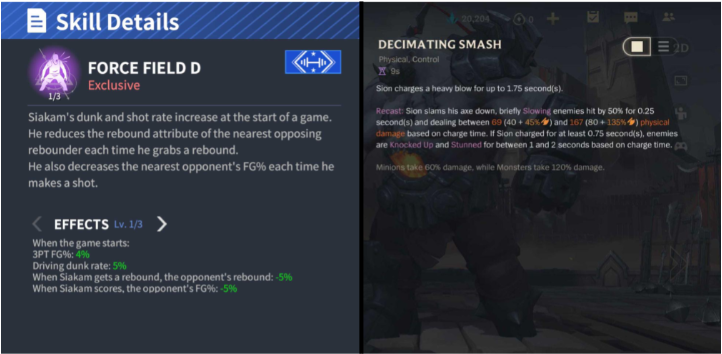
According to Forbes, NBA Infinite was based on Tencent’s previous basketball title, 最强NBA (Super NBA), so it’s no wonder it feels like a game aimed at a Chinese audience.
Based on my experience, NBA Infinite targets a more casual audience and puts the emphasis on stats over skills, while NBA 2K24 is more for basketball simulation fans. In practice, it means that games like NBA Infinite typically end up with players doing their own thing, with barely any teamwork, and are clearly aimed at players who want to dominate the game (by spending, of course).
NBA 2K24 is much more “pure” here, but the simulation feel may not be to everyone’s taste. It was concerning that I couldn’t get any multiplayer matches at all, though this is offset by its robust single-player modes.
Overall, while these two games on the surface look very similar, they are aimed at quite different audiences and should be able to find their niches. However, neither of them are doing particularly well. My take is that NBA 2K24 has a greater chance of finding further success (in the West, at least). It’ll need to further streamline the experience for mobile though, as the UI/UX felt clunky and slow, and in-game controls weren’t responsive.
Our Game Design Consulting Services

Today we’re highlighting our full lifecycle design services. This includes customised game deconstructions, core/metagame concepting, feature design, economy modeling, gameplay balancing, monetisation design, and much more across platforms and genres. Here is what one of our clients had to say.

“We’ve had a couple of very productive engagements with the Naavik team of experts. With their external perspective and extensive industry knowledge, the conversations and reports that were generated during our work together helped our studio enhance and shape the future of the games.”
- Elad Lebovitch, Founder & CEO at Banditos Studios
If you’d like to learn more, reach out here! Also check out our expanded consulting service portfolio here.





